
The Taiping Rebellion, also known as the Taiping Civil War or the Taiping Revolution, was a civil war in China between the Manchu-led Qing dynasty and the Hakka-led Taiping Heavenly Kingdom. The conflict lasted 14 years, from its outbreak in 1850 until the fall of Taiping-controlled Nanjing—which they had renamed Tianjing "heavenly capital"—in 1864. However, the last rebel forces were not defeated until August 1871. Estimates of the conflict's death toll range between 20 and 30 million people, representing 5–10% of China's population at that time. While the Qing ultimately defeated the rebellion, the victory came at a great cost to the state's economic and political viability.

Wuhan is the capital of Hubei, China. With a population of over eleven million, it is the most populous city in Hubei and the eighth-most-populous city in China. It is also one of the nine national central cities and the second most livable city in China.

Wuchang is one of 13 urban districts of the prefecture-level city of Wuhan, the capital of Hubei Province, China. It is the oldest of the three cities that merged into modern-day Wuhan, and stood on the right (southeastern) bank of the Yangtze River, opposite the mouth of the Han River. The two other cities, Hanyang and Hankou, were on the left (northwestern) bank, separated from each other by the Han River.
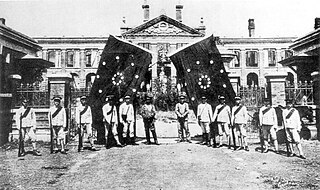
The Wuchang Uprising was an armed rebellion against the ruling Qing dynasty that took place in Wuchang in the Chinese province of Hubei on 10 October 1911, beginning the Xinhai Revolution that successfully overthrew China's last imperial dynasty. It was led by elements of the New Army, influenced by revolutionary ideas from Tongmenghui. The uprising and the eventual revolution directly led to the downfall of the Qing dynasty with almost three centuries of imperial rule, and the establishment of the Republic of China (ROC), which commemorates the anniversary of the uprising's outbreak on 10 October as the National Day of the Republic of China.
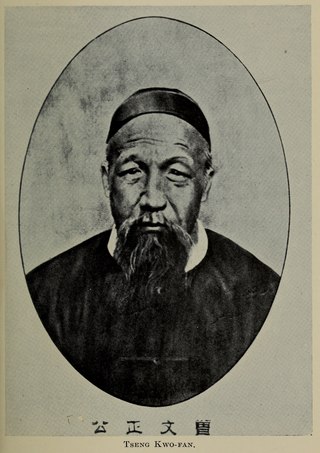
Zeng Guofan, Marquis Yiyong, birth name Zeng Zicheng, courtesy name Bohan (伯涵), was a Chinese statesman and military general of the late Qing dynasty. He is best known for raising and organizing the Xiang Army to aid the Qing military in suppressing the Taiping Rebellion and restoring the stability of the Qing Empire. Along with other prominent figures such as Zuo Zongtang and Li Hongzhang of his time, Zeng set the scene for the Tongzhi Restoration, an attempt to arrest the decline of the Qing dynasty. Zeng was known for his strategic perception, administrative skill and noble personality on Confucian practice, but also for his ruthlessness in repressing rebellions.
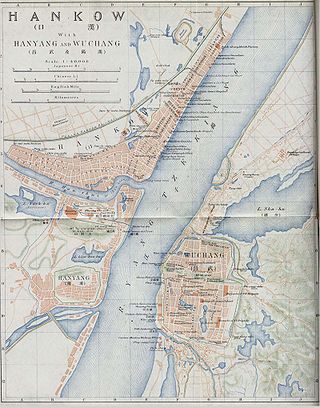
Hankou, alternately romanized as Hankow, was one of the three towns merged to become modern-day Wuhan city, the capital of the Hubei province, China. It stands north of the Han and Yangtze Rivers where the Han flows into the Yangtze. Hankou is connected by bridges to its triplet sister towns Hanyang and Wuchang.

The Battle of Wuhan, popularly known to the Chinese as the Defence of Wuhan, and to the Japanese as the Capture of Wuhan, was a large-scale battle of the Second Sino-Japanese War. Engagements took place across vast areas of Anhui, Henan, Jiangxi, Zhejiang, and Hubei provinces over a period of four and a half months. It was the single largest, longest, and bloodiest battle of the entire Second Sino-Japanese War. More than one million National Revolutionary Army troops from the Fifth and Ninth War Zone were put under the direct command of Chiang Kai-shek, defending Wuhan from the Central China Area Army of the Imperial Japanese Army led by Shunroku Hata. Chinese forces were also supported by the Soviet Volunteer Group, a group of volunteer pilots from Soviet Air Forces.
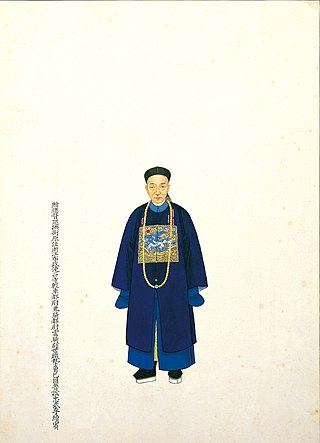
Li Xubin, courtesy name Di'an (迪庵) or Kehui (克惠), was a Chinese military general who lived in the Qing dynasty. He was a commander of the Xiang Army, a military force raised by the Qing government to help the imperial forces in suppressing the Taiping Rebellion. His younger brother, Li Xuyi, was also a commander in the Xiang Army.
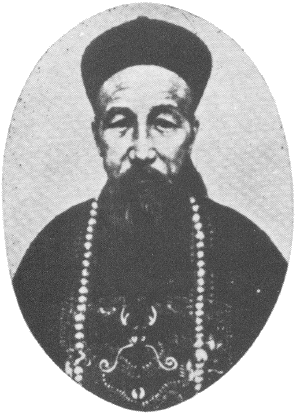
The Xiang Army or Hunan Army was a standing army organized by Zeng Guofan from existing regional and village militia forces called tuanlian to contain the Taiping Rebellion in Qing China. The name is taken from the Hunan region where the Army was raised. The Army was financed through local nobles and gentry, as opposed to through the centralized Manchu-led Qing dynasty. The army was mostly disbanded by Zeng after the re-capture of the Taiping capital at Nanking.
The Battle of Nanjing (1853) began after the fall of Wuhan on March 8, 1853, and ended with the fall of the capital city of Nanjing on March 19, 1853, to Taiping troops, a few days after the Qing government evacuated the city.
Wei Jun born in Guangxi, Wei Changhui's brother's son, was a Chinese Colonel General during the Taiping Rebellion and later served as the general of the Taiping monarchy in the early and middle stages of the rebellion. He attacked the Wuchang three times, and occupied the district successfully in 1855. In the third battle of Wuchang, the 100,000 Taiping troops he commanded shot the Xiang Army's spirit master Luo Zenan, which disrupted Zeng Guofan and the Xiang Army.

The Taiping Heavenly Kingdom, or the Heavenly Kingdom of Great Peace (1851–1864), was a theocratic monarchy which sought to overthrow the Qing dynasty. The Heavenly Kingdom, or Heavenly Dynasty, was led by Hong Xiuquan, a Hakka man from Guangzhou. Its capital was at Tianjing, present-day Nanjing. The unsuccessful war it waged against the Qing is known as the Taiping Rebellion.

The bridges and tunnels across the Yangtze River carry rail and road traffic across China's longest and largest river and form a vital part of the country's transportation infrastructure. The river bisects China proper from west to east, and every major north–south bound highway and railway must cross the Yangtze. Large urban centers along the river such as Chongqing, Wuhan, and Nanjing also have urban mass transit rail lines crossing the Yangtze.
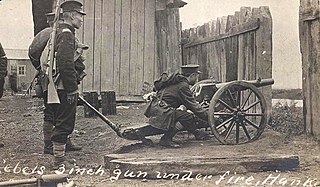
The Battle of Yangxia, also known as the Defense of Yangxia, was the largest military engagement of the Xinhai Revolution and was fought from October 18 to November 27, 1911, between the revolutionaries of the Wuchang Uprising and the loyalist armies of the Qing dynasty. The battle was waged in Hankou and Hanyang, which along with Wuchang collectively form the tri-cities of Wuhan in central China. Though outnumbered by the Qing armies and possessing inferior arms, the revolutionaries fought valiantly in defense of Hankou and Hanyang. After heavy and bloody fighting, the stronger loyalist forces eventually prevailed by taking over both cities, but 41 days of determined resistance by the Revolutionary Army allowed the revolution to strengthen elsewhere as other provinces defied the Qing dynasty. The fighting ended after the commander-in-chief of the Qing forces, Gen. Yuan Shikai, agreed to a cease-fire and sent envoys to peace talks with the revolutionaries. Political negotiations eventually led to the abdication of the Last Emperor, the end of the Qing dynasty and the formation of a unity government for the newly established Republic of China.

The Battle of Anqing (安慶之戰) was a prolonged siege of the prefecture-level city of Anqing in Anhui, China, initiated by Hunan Army forces loyal to the Qing Dynasty against the armies of the Taiping Heavenly Kingdom. The siege began in September 1860 and ended on September 5, 1861, when imperial forces under the command of Zeng Guoquan breached the walls of the city and occupied it.
Jiang Zhongyuan, courtesy name Changrui, (常孺) was a scholar and soldier from Hunan who fought for the Qing and against the Taiping Heavenly Kingdom during the Taiping Rebellion.
The prefecture-level city of Wuhan, the capital city of Hubei province, China, has a long and rich history that dates back over 3,500 years. Starting out from the Shang dynasty-era archaeological site at Panlongcheng associated with Erligang culture, the region would become part of the E state and Chu state during the Zhou dynasty. The region evolved into an important port on the middle reaches of the Yangtze River, and the cities of Hanyang, Hankou and Wuchang were united into the city of Wuhan in 1926. Wuhan briefly serving as the capital city of China in 1927 and in 1937. Modern-day Wuhan is known as 'China's Thoroughfare' (九省通衢) due to its status as a major transportation hub, with dozens of railways, roads and expressways passing through the city and connecting to other major cities.
The Battle of Changsha was fought in the early years of the Taiping Rebellion throughout 1852. After defeating Qing forces in Guangxi, the Taipings advanced into neighboring Hunan province. The city was heavily defended and a delay in the Taiping advance allowed Qing forces to reinforce the city. The first attempt to advance north was stopped at an ambush at the Suoyi ford in the Xiang River, where over 10,000 Taiping sailors and soldiers were killed.
The Eastern Expedition encompassed the Taiping Heavenly Kingdom's efforts to capture the Yangtze River Delta, the provinces of Jiangsu, Anhui, and Zhejiang. Most of the areas would eventually be occupied by the Taipings, but they were notably repulsed at several locations, especially the city of Shanghai. Following the Jintian uprising in the southern province Guangxi and the beginning of open hostilities, Taiping forces attacked and captured Nanjing in central China by 1853. The Western Expedition captured cities along the Yangtze River like Zhenjiang, Anqing were captured later the same year.
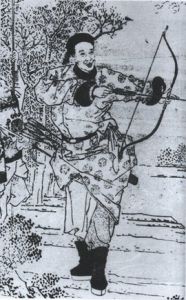
Taqibu, courtesy name Zhiting, member of the Tao Jia clan, a native of Manchuria's Bordered Yellow Banner, was promoted to the rank of retainer in his early years as an officer of the guards. Thereafter, he was expatriated to Hunan as a guerrilla. During this period, Taqibu's military talents were discovered by Zeng Guofan, and thus began to make a name for himself. On the recommendation of Zeng Guofan, Taqibu participated in the formation of the Hunan army and became Zeng Guofan's right-hand man. In the war with the Taiping Heavenly Kingdom, Taqibu led his troops to defeat the Taiping Army in Xiangtan, Yuezhou, Wuchang, and so on, and he was promoted to provincial military commander of Hunan, granted the title of Khatun Batulu Yong, and the position of riding lieutenant. In the war with the Taiping Heavenly Kingdom, Taqibu led his troops to defeat the Taiping Army in Xiangtan, Yuezhou, Wuchang, and so on, and he was promoted to governor of Hunan, granted the title of Khatun Batulu, and the position of cavalry lieutenant. Soon, Wuchang lost to the hands of the Taiping army, in the Qing army began to counterattack, the eve of the attack on Jiujiang, Taqibu died of illness due to exhaustion in the camp, the Qing court posthumously awarded the third-class lieutenant position.













